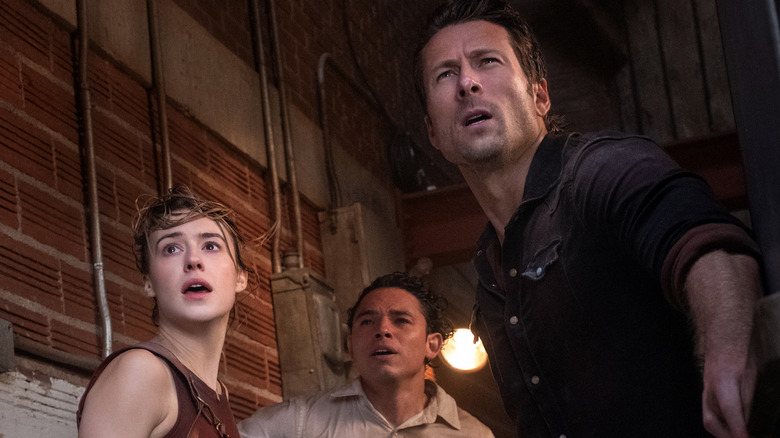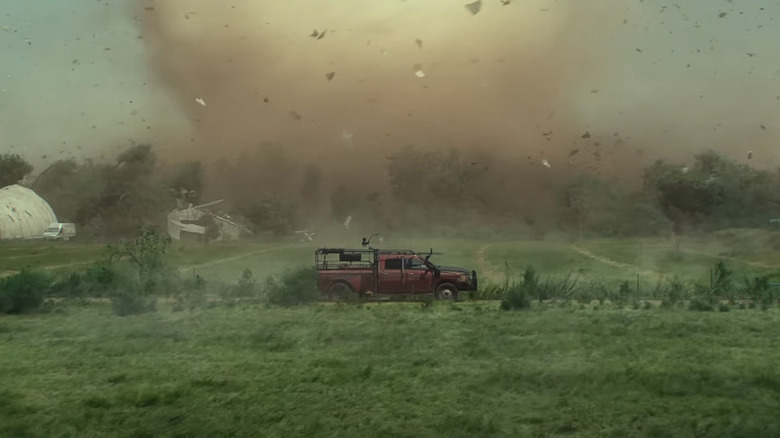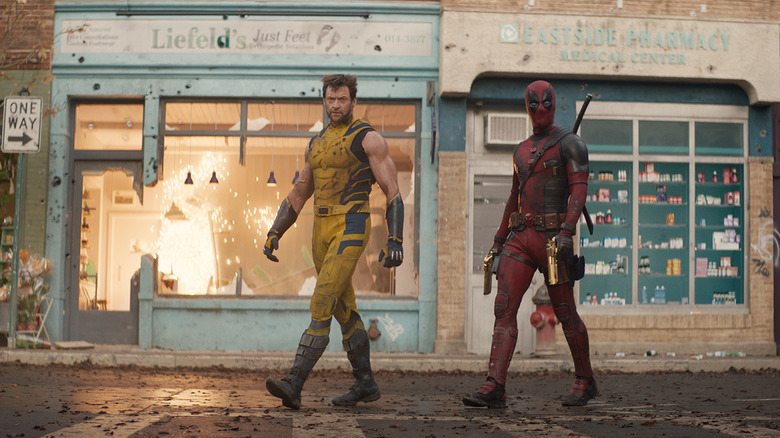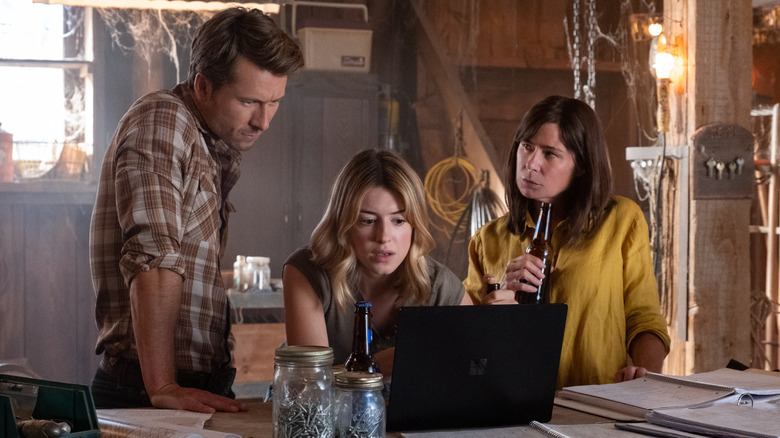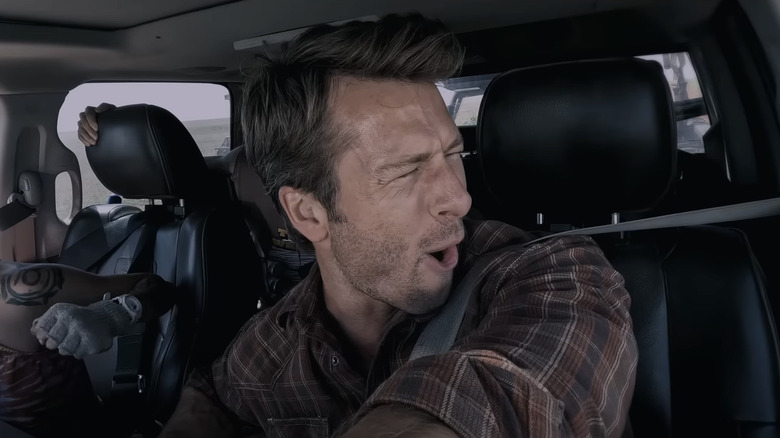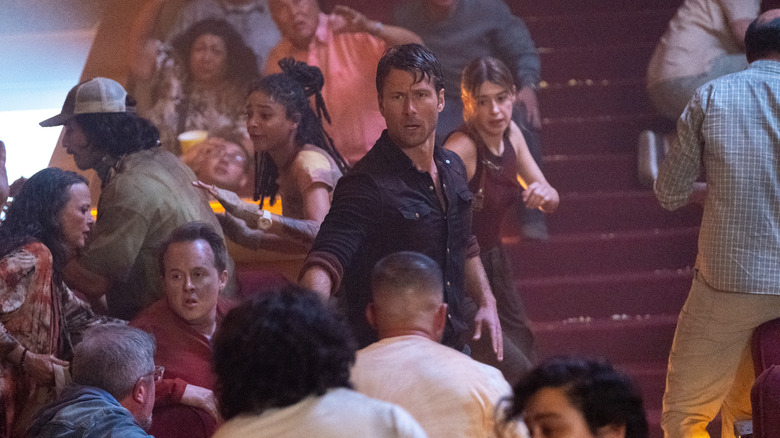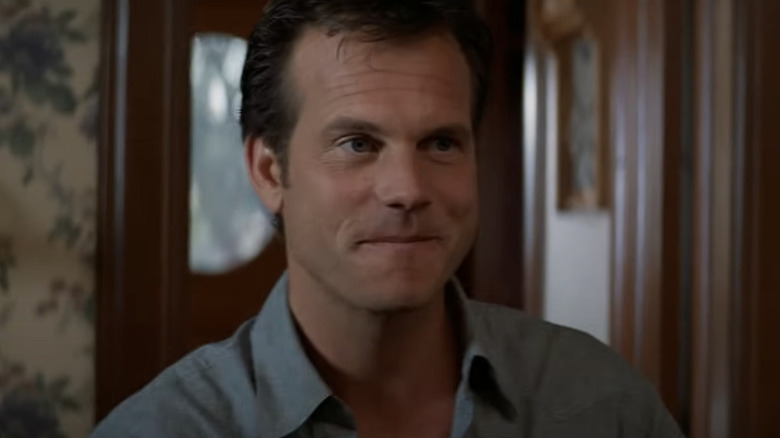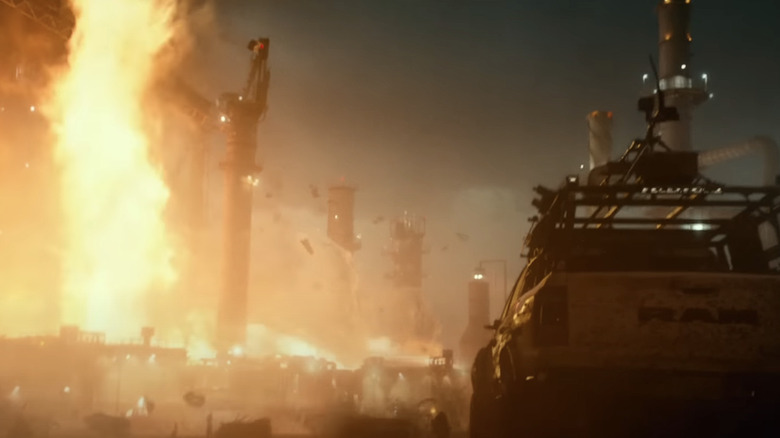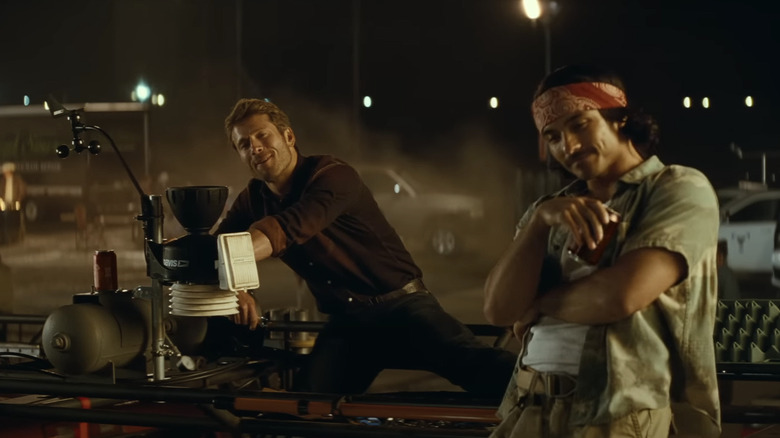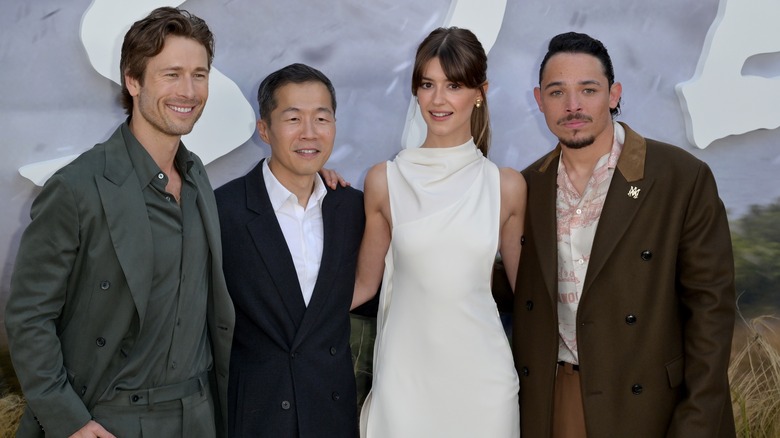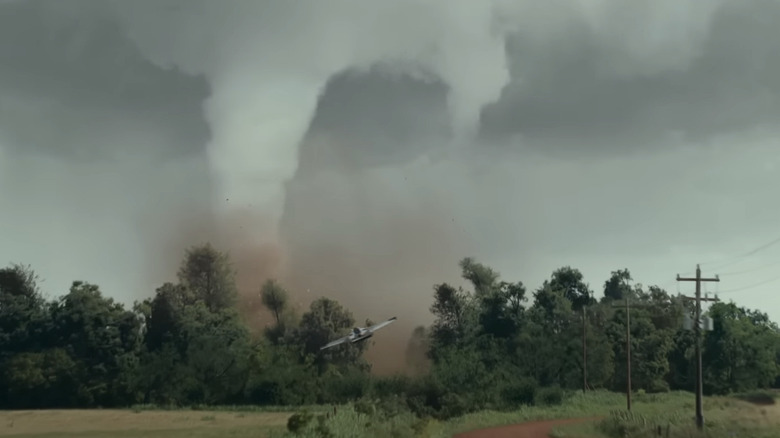Why Twisters Blew Everyone Away At The Box Office
"Twisters" is kicking up quite a storm at the domestic box office. The sequel to the 1996 film "Twister" has brought in revenue some are describing as historic, fueling the slowly building momentum of this year's summer box office.
Though its success has done little to quell the fears of studio heads and box office analysts (who are comparing 2024's mixed summer performance with last year's "Barbenheimer"-fueled pre-pandemic numbers), "Twisters" is understandably still thrilling the likes of Universal Pictures President of Domestic Distribution Jim Orr, who oversaw the film's whirlwind U.S. rollout. "We had big aspirations for it to begin with, and it certainly exceeded those," he told Variety. "We're seriously over-indexing between coasts which is fun to see as well."
As Orr implied, a good chunk of the film's domestic box office is coming from the Midwest — with an imaginative marketing plan enticing those audience members into theaters, in some cases for premium theatrical experiences. But the most important takeaway from the success of "Twisters" so far is also arguably the simplest. Beyond smart casting and nostalgia for the original feature, audiences are simply loving the film. David A. Gross of consulting firm Franchise Entertainment Research described the sequel as "perfect summer entertainment" to Variety. But will winds this strong be able to withstand "Deadpool and Wolverine" on the horizon? Let's analyze the numbers and see what we find.
What did Twisters make at the box office?
At press time, "Twisters" has made $90.4 million in the U.S. alone, including an $81 million opening weekend. This meant that the legacy sequel beat its initial projection of a $50 million opening by 60%. It's also doing incredibly well compared to other hot summer features.
For comparison, let's look at the domestic openings for a few other summer hits that had strong debuts — "Bad Boys: Ride or Die," $56.5 million; "A Quiet Place: Day One," $52.2 million; "Despicable Me 4," $75 million. Domestically, "Twisters" is currently outpacing those three movies, all of which have earned spots in the top 10 highest-grossing films of 2024 in the U.S. — and its opening is only a couple of million behind that of "Dune: Part Two," which comfortably enjoys the No. 2 spot. Worldwide, however, the story is slightly different.
In other territories, "Twisters" has raked in another $42.7 million, making for a debut of over $123 million at the worldwide box office. As a quintessential American blockbuster, it isn't totally surprising that it hasn't kicked up much dust outside the States. But while this factor might alienate audiences in other countries and ultimately hold back the film's global potential, it does seem to play a huge role in its box office success at home.
Twisters dodged Deadpool and Wolverine
As is often the case with successful blockbusters, "Twisters" was released during a time when there weren't many other movies to dilute its success. While the sequel sits at No. 1 at the box office, the two runners-up are "Inside Out 2" and "Despicable Me 4" — animated features directed primarily at families with young children. Even if they were reasonably competitive titles (one might be able to make that argument for "Inside Out 2"), they debuted weeks ago at this point, giving "Twisters" plenty of runway regardless of who their target audience was.
Universal also made the smart move of scheduling "Twisters" ahead of Marvel Studios' "Deadpool and Wolverine," which will likely blow audiences away when it arrives on July 26 and dominate the worldwide box office for several weeks afterward. The closeness between the two films could hurt "Twisters" in the short term, potentially leading to a larger than expected drop-off after the Marvel movie hits theaters — but even then, "Twisters" does have the advantage of a PG-13 rating, which may allow it to hold its own against its R-rated opponent.
Critical reviews were mostly kind
As we learned during our rewatch of "Twister," that film was never expected to be a critical darling. Star Bill Paxton was so worried about the impact it would have on his career that he was already looking ahead to his next project during production. And while Glen Powell may be looking ahead to Edgar Wright's "The Running Man" (a film which has long deserved a modern-day remake), he at least doesn't have to worry about the same critical reception haunting him.
On the online review aggregator Rotten Tomatoes, "Twisters" has held strong with a "Certified Fresh" 77%, out-scoring the 1996 film's un-certified 67%. Meanwhile, on Metacritic (which averages critics' scores out of 100), the film received a "generally favorable" score of 65/100, which places it just three points lower than its predecessor.
Alissa Wilkinson of the New York Times stated the film was "loaded with fun and ... enough danger to keep you on your toes." In a three-out-of-four star review for RogerEbert.com, Tomris Laffly wrote that it managed to be "an enthralling summer blockbuster on the whole" thanks to Powell's performance, even if it fell short of its full potential. Rolling Stone's David Fear, however, seemingly felt "Twisters" was not just a disaster film, but "a hunt for the old magic of the big-screen, big-tent movies themselves."
Audiences were pulled right in
Of course, especially in the age of social media, critics are just half of a film's initial public reception. CinemaScore, which surveys moviegoers on their way out of the theater and assigns a letter grade based on the results, gave "Twisters" an admirable "A-" grade. The film is performing similarly at online-based review aggregators as well — the Rotten Tomatoes audience score currently rests at 92%, and its average IMDb star rating from users has reached 7.1 out of 10 (though it's worth noting that, for whatever reason, its Metacritic score is significantly lower at 5.1 out of 10).
National Association of Theatre Owners President and CEO Michael O'Leary offered to the Associated Press that the box office performance of "Twisters" is "just further evidence that when you create something that's compelling and interesting and has broad appeal, that all across the country people will show up." Though the opening itself is staggering, O'Leary seemed even more excited about how the film could perform in coming weeks, as those who didn't make it out to theaters yet hear about how much those who did loved it. He told the AP, "I think the word of mouth on this movie is going to be exceptional."
There was much online discourse
Though positive word of mouth is important to any film's success, the right amount of online discourse can sometimes be just as effective. For "Twisters," two topics up for debate online kept the film on the minds of moviegoers, and arguably stirred up interest in seeing the movie. The most divisive bit of discourse concerned the creative decision not to reference the ongoing existential climate crisis in one of the few films made specifically about the weather.
It's frustrating to some that the movie seemingly chose to stay silent to avoid upsetting potential ticket buyers (though even some arguments in favor of introducing this issue into the narrative noted that there is not scientific certainty as to whether or not climate change has an effect on tornadoes). "Twisters" director Lee Isaac Chung told CNN that he didn't want to preach to the audience, feeling that the movie shouldn't be "message-oriented." Bob Bagby, chair of the National Association of Theater Owners, suggested that moviegoers respond to films that allow them to escape from reality, even though climate change is an important issue.
Meanwhile, some social media users were perplexed by a deleted scene of Glen Powell and Daisy Edgar-Jones' characters, Tyler and Kate, kissing at the film's end. Chung told Entertainment Weekly, "If it ends on the kiss, then it makes it seem as though that's what Kate's journey was all about, to end up with a kiss."
It's the first major disaster movie in a long time
In bygone eras of Hollywood, filmmakers like Irwin Allen and Roland Emmerich were able to base their entire careers on making movies about natural disasters destroying various cities and landmarks. As morbid as it may sound, these perfect storms of spectacle and drama were consistently sound investments for the entertainment industry. But it may shock readers to learn that "Twisters" is the first major natural disaster film to make it to American cinemas since 2018.
In 2020, the Gerard Butler sleeper hit "Greenland" was arguably poised to bring the genre back as a summer staple, with the film receiving positive reviews from most critics. As readers may have already predicted, however, multiple COVID-19-related delays ultimately led the film to be released directly to video-on-demand services. This was a quiet but devastating blow to the genre, which has only seen four major releases, "Twisters" included, in the last decade — two of which, "Greenland" and "Geostorm," starred Butler (the fourth being the Dwayne Johnson-led "San Andreas").
For those lamenting the "Twister" sequel starring original cast member Helen Hunt that never got a chance, time will only tell if "Twisters" has revived the genre in any capacity — though it's hard to imagine a sequel isn't being discussed given the box office numbers already in play.
It's a sequel to a beloved '90s hit
Speaking of the bygone era of disaster movies, arguably one of the most memorable entries to come out of that time was the original "Twister," a 1996 hit that made storm chasing look so cool that the University of Oklahoma's meteorology program doubled in size during the years following its release. The mere fact that a sequel has been made after nearly 30 years speaks to the cultural impact that the original film had and continues to have, with "Twisters" being able to capitalize on that nostalgia clearly to great effect.
It's also worth noting that "Twisters" arrived during a year in which audiences appear to be embracing sequels rather than rejecting them as they did in 2023. From follow-ups in the once reliable superhero genre ("Shazam: Fury of the Gods," "Ant-Man and the Wasp: Quantumania," "The Marvels") to franchise sequels like "Indiana Jones and the Dial of Destiny," "Fast X," and "Mission: Impossible — Dead Reckoning," sequels weren't performing quite as well as expected and were in some cases the biggest bombs of the year. This year, however, nine out of the 10 high-grossing films domestically are currently sequels (that number was four in 2023).
Twisters recaptured the original's magic in a bigger way
While "Twisters" manages to bring back the overall feeling of the original 1996 movie, it does so with the benefit of nearly three decades of technological advancements in both filmmaking and visual effects. This stuck out to research consultant David A. Gross as a vital part of the formula that makes this sequel such a sweeping success. "This is essentially the same havoc we saw the first time, but it's 28 years later, and the spectacle, the special effects and the set pieces are bigger and better," he told Variety.
The sheer spectacle of "Twisters" is something to behold, with the film accomplishing such feats as credibly depicting a tornado on fire. But admittedly for some, including original "Twister" director Jan de Bont, that may cost the film some of the magic the original had to offer. "When things [in 'Twister'] fell from the sky, there were real things falling from a helicopter," he told Inverse in 2023 when asked about the then-upcoming sequel. "If you film a car escaping a tornado in a hail storm, it was real ice that came at us. It's a movie that cannot be remade ... That would never, ever happen again."
A glittering cast of rising stars led the way
What "Twisters" may lack in practical visuals, it makes up for with star power. The original "Twister" cast oozed with talent and charisma, boasting a lineup that included Helen Hunt, Bill Paxton, and Philip Seymour Hoffman, as well as genre favorites Jami Gertz, Cary Elwes, and Alan Ruck.
That cast is a tough act to follow, but one "Twisters" did in extraordinary fashion. Leading the cast is Daisy Edgar-Jones, one of the breakout stars of the Hulu series "Normal People" (the other being Paul Mescal of "Gladiator 2"). Flanking her throughout the film are former Broadway star Anthony Ramos (solidifying himself as a blockbuster stalwart following appearances in the "Godzilla" and "Transformers" franchises) and Glen Powell, an undeniably charming actor whose meteoric rise began with "Top Gun: Maverick" and hasn't slowed down since. Many reviews noted Powell's performance as one of the film's highest selling points.
Jim Orr told Variety that the trio are "incredibly engaging and charming," adding, "The audience reaction scores across all demographics speaks volumes about our cast." The supporting cast includes Kiernan Shipka (doing box office double duty with "Longlegs"), Maura Tierney, and David Corenswet, an actor whose career is set to take flight next year when he stars in James Gunn's highly anticipated "Superman" reboot.
It was helmed by the perfect director for the job
From the inception of the "Twister" sequel project, it seemed that Universal was anxious to get a solid director on board with a proven track record for success. They initially went with Joseph Kosinski, an obvious choice given the legacy sequels he was able to craft in "Tron: Legacy" and "Top Gun: Maverick." But when Kosinski dropped out to shoot the Brad Pitt sports drama "F1," Universal needed another filmmaker that had good storytelling instincts and the ability to work not only with a major studio, but within a pre-existing universe as well.
Fortunately, they found Lee Isaac Chung, who — in addition to earning critical acclaim and an Academy Award nomination for his film "Minari" — had already successfully directed an episode of the Disney+ "Star Wars" series "The Mandalorian" for its third season. Lucasfilm president Kathleen Kennedy was so impressed by his work that she championed him to her husband Frank Marshall, one of the producers of "Twisters." Following a pitch that combined original footage from "Twister" with footage from "Minari," he landed the job.
Country music helped draw in overlooked audiences
In addition to a breathtaking trailer that was one of the best seen during the 2024 Super Bowl, "Twisters" relied relatively heavily on a country music marketing campaign to secure its core audience. Luke Combs (a country music star from North Carolina ironically known for songs like "Hurricane") was tapped to write an original single for the film titled "Ain't No Love in Oklahoma." The song was released before the film itself, along with a music video which featured footage from "Twisters" intercut with Combs performing.
As of this writing, "Ain't No Love..." has been streamed more than 56 million times. The entire "Twisters" soundtrack, meanwhile, currently has 75 million streams total. The film's marketing overall has targeted audiences in the Midwest — and done so successfully. "Twisters" has reportedly overperformed in this part of the country, especially in regions where tornados are an ever-present menace, with the top-performing theater showing the film located in Moore, Oklahoma ("Twisters" is set in the state).
It's the perfect film for specialty screens
One aspect of theatrical marketing and sales that's often overlooked is the premium ticket up-sell. This concept was arguably pioneered by the introduction of 3D technology to theaters, allowing them to charge a premium price by offering ticket buyers a unique viewing experience that couldn't be replicated at home. It's a marketing gimmick so successful, certain films throughout the 2000s and 2010s were shot specifically for 3D screens. An argument could be made that a similar dynamic exists today between certain films and IMAX — thanks to filmmakers like Christopher Nolan utilizing IMAX to create more innovative cinema.
Today, the variety of specialty screens is wider than ever, offering audiences specific enhancements to their viewing experience by elevating qualities like sound (Dolby Atmos and Regal RPX) and field of vision (Regal's ScreenX). A film like "Twister" is practically tailor-made for these sorts of upgrades, perhaps most of all those offered by 4D theaters, which use moving seats, real wind, and sometimes water to make the experience immersive.
Seats in Regal's 4DX theaters can cost upwards of $30 each in major cities — and when Looper went to verify this information by attempting to buy a ticket to "Twisters" in 4DX, there was apparently so much traffic that we had to wait in an online queue. Kansas City theater owner and NATO chairman Bob Bagby told the AP that his 4DX screens were almost sold out for the entire opening weekend of "Twisters."
